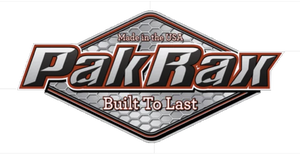
Steel vs. Aluminum: The Real Story Behind Overlanding Armor (And Why Serious Off-Roaders Choose Steel)
When it comes to outfitting an overlanding rig, few debates are as heated as steel vs aluminum overland armor. Every forum, trail meetup, and social feed eventually circles back to the same question: What material gives you the most reliable protection when the trail turns technical?
At PAKRAX, our answer is clear—100% USA-grade steel. And that choice isn’t about following trends; it’s grounded in real trail abuse, engineering consistency, and more than 25 years of fabrication expertise from our founder, Greg Rodriguez.
If your adventures take you anywhere near rocks, ledges, washouts, or technical 4x4 trails, here’s what you need to know.
Strength vs. Flex: Why Steel Wins Off-Road
When your rig drops onto a rock, the last thing you want is your armor bending, flexing, or deforming. Steel withstands impact, torsion, and shear forces far better than aluminum, which is naturally softer.
This matters most for protection-critical products like PAKRAX steel rock sliders, which are built to take repeated hits without failure.
Steel advantages on the trail:
- High impact resistance
- Superior performance during rock strikes or frame contact
- Resists deformation under vehicle weight
- Tolerates repeated stress without cracking
Repairability: The Trail-Side Reality Check
Here’s something many new overlanders don’t think about: trail repairs.
If you crack or bend aluminum, you’re done until you reach a specialized shop—aluminum requires controlled welding conditions.
Steel, however, can be repaired:
- With a basic welder
- In small fabrication shops
- By trail groups that carry portable welders
- In remote areas where aluminum repair isn’t possible -- Sometimes just a hammer or sledge can bend it back into place.
Weight Isn’t the Enemy — Failure Is
Some will argue that aluminum is lighter, and that’s true. But when you're running rooftop tents, recovery gear, and heavy storage, the priority isn’t fuel savings—it’s strength, stability, and protection.
If you're carrying camp gear or a rooftop tent, a Tacoma bed rack system built from steel provides superior stability where it matters most.
Structural Integrity Matters — Especially on Tacoma Beds
The Tacoma’s composite bed is known for flex under load, especially on rough trails. That’s why PAKRAX steel bed stiffeners are essential for off-roaders carrying gear, tools, coolers, and rooftop tents.
This added reinforcement keeps your bed rails from cracking or spreading during high-load situations.
Why PAKRAX Chooses U.S.-Grade Steel Every Time
Every PAKRAX product is designed, cut, welded, powder-coated, and tested entirely in the USA using trusted USA-grade steel.
That includes:
- Rock sliders for 4Runner & Tacoma
- Steel bed racks for overlanding
- Bed stiffeners for composite beds
- PAKRAX steel roof rack
- High-clearance Tacoma rear bumper
- Steel tailgate panel
Every product is built with real-world off-road conditions in mind—not theory.
Built by a Fabricator Who Actually Off-Roads
PAKRAX founder Greg Rodriguez brings:
- 25+ years as a CWI-certified welder
- Deep experience in custom 4x4 fabrication
- U.S. Military-grade metal project experience
- Thousands of miles on some of the Southwest’s toughest trails
When Greg designs a slider, rack, or bumper, it comes from experience—not speculation.
The Bottom Line: If You Off-Road Hard, You Want Steel
Aluminum has its place for lightweight accessories, but when it comes to protecting your rig, steel wins every time.
If you want even more trail performance, consider upgrading with the Anytime Locker Kit, which lets you engage your locker in 2WD or at any speed for total control.
Serious off-roaders choose steel because:
- It withstands hard impacts
- It protects the rig and driver
- It’s repairable anywhere
- It lasts the lifetime of the vehicle
- It’s trusted by professionals and overlanders alike
When your adventure takes you far from pavement, your armor should be the strongest, most reliable part of your rig. And that’s why PAKRAX chooses steel—every single time.
